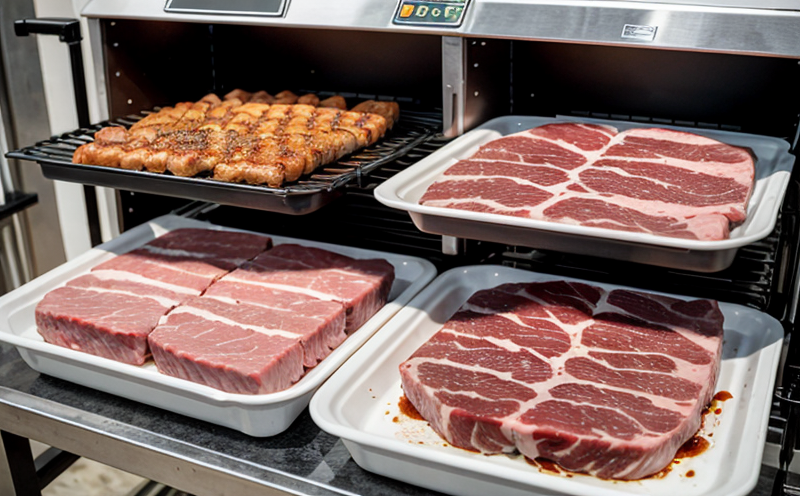ISO 29201 Antibiotic Residue Detection in Meat and Poultry
The ISO 29201 standard is a comprehensive guide for detecting antibiotic residues in meat and poultry products. This service ensures that food safety standards are met, protecting consumers from potential health risks associated with the overuse of antibiotics in livestock.
Antibiotic resistance has become a significant global concern, particularly within the food industry. The improper use or overuse of antibiotics can lead to resistant strains of bacteria, which may pose serious threats to human health if consumed through contaminated meat and poultry products. ISO 29201 provides a standardized approach for detecting antibiotic residues, ensuring that only safe products reach the market.
The testing process involves multiple steps, including sample preparation, extraction, and analysis using advanced laboratory techniques. The primary goal is to ensure that no detectable levels of antibiotics are present in meat or poultry intended for human consumption. This service plays a crucial role in maintaining public health standards and regulatory compliance.
ISO 29201 is particularly important in countries with strict food safety regulations, such as the European Union (EU) and the United States. Compliance with this standard can enhance a company's reputation and trustworthiness among consumers. Additionally, it helps businesses avoid potential legal issues and financial penalties associated with non-compliance.
Our laboratory uses state-of-the-art equipment and methodologies to conduct these tests accurately and efficiently. We adhere strictly to ISO 29201 guidelines, ensuring reliable results that meet international standards. Our expertise in this area allows us to provide clients with detailed reports on their products' compliance status, helping them make informed decisions about quality assurance.
By offering ISO 29201 antibiotic residue detection services, we contribute significantly to maintaining global food safety standards and fostering trust between producers and consumers worldwide. This service is essential for ensuring that meat and poultry products are safe for consumption while adhering to stringent regulatory requirements.
Why It Matters
The presence of antibiotic residues in meat and poultry can have severe implications for public health. Consuming such products might lead to the development of drug-resistant bacteria, which could cause infections that are difficult or impossible to treat with existing antibiotics. This issue is particularly critical given the increasing prevalence of multi-drug resistant organisms (MDROs).
In response to these challenges, governments and regulatory bodies have implemented stringent measures aimed at reducing antibiotic use in livestock farming and enhancing monitoring practices. For instance, EU Directive 2016/426 requires Member States to monitor antimicrobial resistance in humans and animals, while also promoting responsible antibiotic stewardship.
ISO 29201 provides a framework for detecting antibiotic residues effectively, supporting these efforts by ensuring that only compliant products enter the market. By leveraging this standard, businesses can demonstrate their commitment to sustainable practices and ethical sourcing, thereby enhancing consumer confidence and loyalty.
The importance of ISO 29201 extends beyond mere compliance; it represents a proactive approach towards safeguarding public health. Through rigorous testing and meticulous analysis, we help stakeholders stay ahead of emerging threats posed by antibiotic resistance. Our services not only protect consumers but also support the broader goals of sustainable agriculture and responsible veterinary practices.
In summary, ISO 29201 is vital for maintaining food safety standards while addressing pressing concerns related to antibiotic resistance. By integrating this standard into their operations, companies can ensure that their meat and poultry products meet rigorous quality benchmarks, thereby fostering trust among consumers and stakeholders alike.
Eurolab Advantages
At Eurolab, we pride ourselves on offering unparalleled expertise in ISO 29201 antibiotic residue detection services. Our team comprises highly trained professionals who stay abreast of the latest developments in this field, ensuring that our testing methods remain cutting-edge and reliable.
- Comprehensive Testing Capabilities: We employ a wide range of advanced technologies to detect even trace amounts of antibiotics in meat and poultry samples. Our laboratories are equipped with sophisticated instruments that enable precise measurements and accurate results.
- Stricter Compliance Standards: By adhering strictly to ISO 29201 guidelines, we guarantee that our findings align perfectly with international standards. This ensures consistency across different regions and helps maintain a level playing field for all participating entities.
- Innovative Sample Preparation Techniques: Our skilled technicians use innovative techniques to prepare samples efficiently and effectively, reducing potential sources of error during the testing process.
- Rigorous Quality Control Measures: We implement stringent quality control measures throughout our operations, from sample receipt to final report generation. This commitment to excellence ensures that every test conducted by Eurolab meets the highest standards of accuracy and reliability.
Our clients benefit from these advantages through enhanced confidence in their product safety and compliance status. With Eurolab's ISO 29201 services, businesses can rest assured knowing that they are meeting all necessary regulatory requirements while contributing positively to global food safety initiatives.
International Acceptance and Recognition
ISO 29201 is widely recognized and accepted across various international jurisdictions. Its adoption reflects a shared commitment to enhancing food safety standards globally. Here’s an overview of its acceptance in key regions:
- European Union (EU): As part of the EU's efforts to combat antimicrobial resistance, ISO 29201 has been officially recognized as a harmonized standard for detecting antibiotic residues in meat and poultry. Compliance with this standard is mandatory for all food producers operating within EU member states.
- Americas: Countries like the United States and Canada have integrated ISO 29201 into their national frameworks for food safety, ensuring that imported products also adhere to these stringent standards.
- Oceania: Australia and New Zealand are among several countries where ISO 29201 is considered essential for maintaining robust food safety systems. Their governments encourage the use of this standard by endorsing it as a benchmark for quality assurance.
The widespread adoption of ISO 29201 underscores its significance in addressing global health challenges posed by antibiotic resistance. By aligning with these internationally recognized standards, businesses can ensure that their products meet stringent safety criteria, gaining competitive advantages and fostering trust among consumers.





